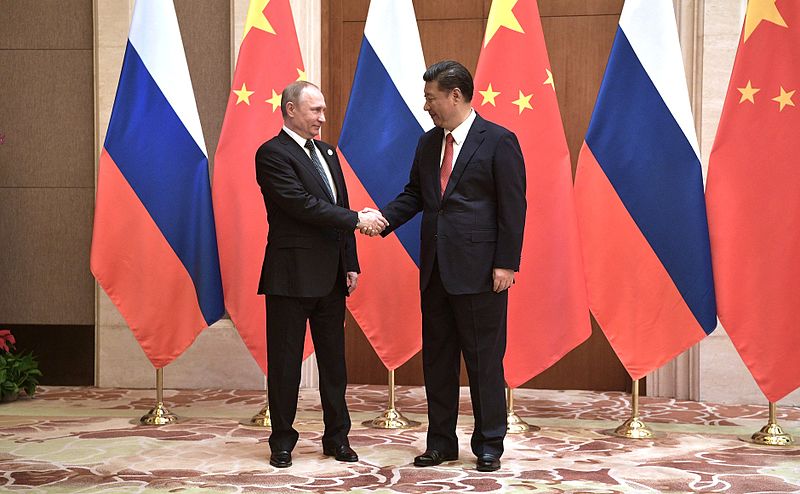Is the UK Doing Enough to Counter Russian and Chinese Interference?

Gracie Moore considers how Russia and China are exerting influence on the UK, and whether we are doing enough to respond.
Two recent incidents have called into question the effectiveness of the UK government and Security Services in responding to efforts from Russian and Chinese intelligence to exert their influence in the UK.
The role of the intelligence agencies (MI5, MI6 and GCHQ) is to protect national security and diffuse threats such as terrorism, espionage and sabotage from hostile foreign powers. The UK, as one of the world’s leading powers, should be well versed in the role, but threats from abroad are increasing by the day, and we are responding poorly.
Time after time, UK governments have failed to grasp the extent of the threat posed by China and offered little in terms of prevention strategy. A scathing report on the extent of Chinese influence was published last month by the parliamentary ISC (Intelligence and Security Committee). Rishi Sunak has insisted that his government is not “complacent” on China but the committee has raised serious concerns, and branded his response as weak.
The report raised issues such as China’s coercive influence in UK Universities – through leveraging fees and funding over UK academics, intimidation and the monitoring and controlling of Chinese students in Britain. It also raised concerns over Beijing’s aim to become a significant player in civil nuclear energy, for example with the heavy Chinese investment in the Sizewell C nuclear plant in Suffolk, which China General Nuclear only exited last year.
The UK is openly of significant interest to China in regard to espionage and interference and is placed just below China’s top priority global targets. According to Tory MP and Chairman of the ISC, Sir Julian Lewis, China has the potential to pose “an existential threat to the liberal democratic system.”
The UK focuses too much on short term economics and has become blind to the long term risks posed by repeatedly accepting huge Chinese investment without scrutiny. It is important to maintain the financial investment that comes from China but not let the country become a vital part of the UK’s national infrastructure. Sunak has said that the UK would “continue adapting … to meet the challenge that China presents.” The report has provided solutions but its now down to whether the government and security services will employ these tactics to reduce the risk of Chinese interference, and even if they do, Russia still poses a significant challenge, and for similar reasons.
It is important to maintain the financial investment that comes from China but not let the country become a vital part of the UK’s infrastructure
In February of this year, three suspected spies for Russia in the UK were arrested and charged in a major national security investigation. The defendants were all Bulgarian nationals allegedly working the Russian security services and were caught possessing identity documents with “improper intention”. The documents included passports, and identity cards for the UK, France, Spain, Italy as well as other European countries, and it is thought that, despite their protests, the suspects were fully cognisant that they were fake.
The three defendants were held by counter-terrorism detectives from the Metropolitan Police (as they have national policing responsibility for espionage) and they are due to answer police bail in September. However, they are only three among five arrested in February under the Official Secrets Act.
The problem lies in the fact that these three alleged spies have lived in the UK for many years, working a variety of jobs and living in a number of different properties. Concerns could have been raised from their daily activity. For example, one of the defendants (Mr Roussev) has had a history with business dealings in Russia and even his LinkedIn profile states that he has owned a business dealing in signals intelligence, involving the interception of communications or electronic signals.
These three alleged spies have lived in the UK for many years
The other two alleged to be working for Russia, Dzhambazov and Ivanova were described by their neighbours in Harrow as being a couple, running a community organisation providing services to Bulgarian people, assisting them with settling into the UK. The neighbours stated that the couple brought cakes and pies as gifts and appeared friendly.
Counter-terrorism units have spoken publicly about the increasing amount of time spent on suspected state threats and espionage. Their concerns are understandable, considering public incidents of recent years, especially involving aggression from Russian intelligence.
In 2018, Russian operatives attempted to murder former double-agent Sergei Skripal and his daughter in Salisbury using Novichok, a deadly nerve agent. Instead, the careless spread of this nerve agent caused loss of life to civilians as well as economic loss from shutting the whole city and the surrounding areas down. A similar incident occurred in 2006 when former Russian-intelligence officer Alexander Litvinenko was killed in London after being poisoned by assassins, also working for Russia. The UK offered little of a significant response to these two blatant examples of aggression.
Overall, the threat posed by both Russia and China are very real and put the UK in a vulnerable position. The UK must reduce its complacency and act faster on threats, viewing China and Russia for what they are rather the investment they bring. To fail to respond properly will harm UK interests and allow the two powers to become ever larger parts of our national infrastructure.


